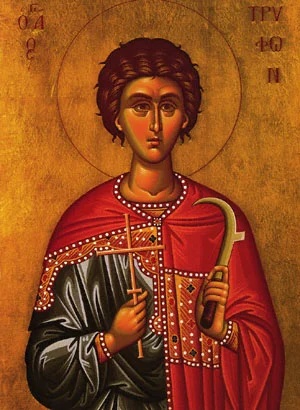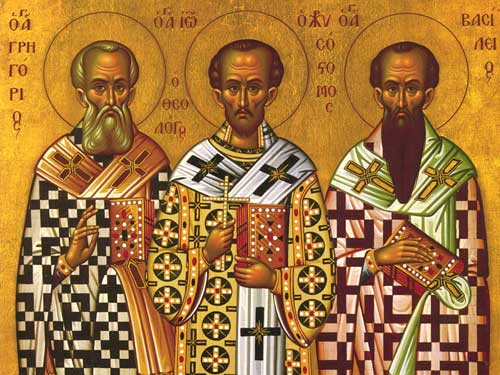“You are the light of the world. A city set on a hill cannot be hid. Nor do men light a lamp and put it under a bushel, but on a stand, and it gives light to all in the house. Let your light so shine before men, that they may see your good works and give glory to your Father who is in heaven. “Think not that I have come to abolish the law and the prophets; I have come not to abolish them but to fulfil them. For truly, I say to you, till heaven and earth pass away, not an iota, not a dot, will pass from the law until all is accomplished. Whoever then relaxes one of the least of these commandments and teaches men so, shall be called least in the kingdom of heaven; but he who does them and teaches them shall be called great in the kingdom of heaven.
Matthew 5: 14-19
Have you ever had an argument with a friend over who is the greatest saint? Not a conversation, an argument. For those who have served on Parish Councils or been to Parish Assembly meetings, has there ever been an argument about who is the greatest of saints? To the contrary, we argue about who is the greatest of sinners, or about the budget or money or property. Several centuries ago, there was a fierce argument over who is the greatest of these three saints—St. Gregory the Theologian, St. Basil the Great and St. John Chrysostom. Each of these saints is well known. Each made a significant contribution to the spreading of the Gospel. And each has his own feastday. St. Basil is celebrated on January 1, St. Gregory the Theologian on January 25 and St. John Chrysostom on November 13. The result of the argument was a feastday to commemorate all three together. Thus, the feast of the Three Hierarchs.
The Three Hierarchs are the patron saints of education because their contribution to Christianity was to write, speak and teach the correct dogmas of the Christian faith—namely the correct theology about the Holy Trinity. The Gospel read for today’s feast is one that comes up frequently—it is part of the Sunday lectionary and is also read on the feast of St. Athanasios (January 18) and on feastdays of other hierarchs. In this passage, Jesus tells His disciples “You are the light of the world.” (Matthew 5:14) He goes on to say “Let your light so shine before men, that they may see your good works and give glory to Your Father who is in heaven.” (5:16) We can’t be very effective lights in the world about any topic without some knowledge. One can’t be a light in the medical world if he or she has had no schooling. Same thing with being a light in the world of architecture, or business, or education. We must first learn something in order to “radiate” that something.
If we are going to be Christian lights in the world, we have to have some knowledge of Christianity. We can’t shine without knowledge. So it is important that we continue to learn throughout our lives. Because the way we learn when we are a child is different than the way we learn as a teenager which is different than the way we learn in middle age. That is because the lens we use to take in the world changes as we change and as society changes. We learn also through repetition. The more times we repeat something, the better we become at it. The more times we hear something the more we internalize what we are hearing. This is why, as an example, the Church provides the Lent and Holy Week cycle each year, so that we can again hear and see the things the Christ did for us, so that we can understand them and commit to living them on a deeper level.
I continually deepen my understanding of who Christ is—this is done through prayer, through Scripture, through reading and listening to others expound on Scripture, through encouragement from others, through worship, through works of charity, and most of all through the Holy Spirit, whose grace meanders through all the things I’ve just listed. If we read Scripture with a humble heart, the Holy Spirit will speak to us through Scripture. If we serve others with a kind heart, the Holy Spirit will speak to us as well.
In Matthew 5:19, we read “whoever then relaxes on of the least of these commandment and teaches men so, shall be called least in the kingdom of heaven; but he who does them and teaches them shall be called great in the kingdom of heaven.” The Three Hierarchs each had a deep knowledge of the Lord. Each had a great desire to share this knowledge. And when the Church was in crisis, because schism was dividing the Church into different camps as to who was believing what doctrine, these men stood confident in the face of ridicule, standing up for the truth of Christ and proclaiming it boldly to all.
It is important to remember today especially the importance of religious education. Without knowledge of the faith, we have no power to share it or spread it. And even more than knowledge, we need conviction, for we live in a world that is trying, it seems, to “relax” many of the commandments and many of the things that we believe about God. Christ’s light will always shine in the world, so long as there are people bold enough to shine it.
Those three magnificent luminaries of the tri-solar Godhead, who lit up the whole world with rays of divine doctrines; those mellifluent rivers of wisdom, who irrigated all creation with the waters of the knowledge of God; Basil the Great, and Gregory the Theologian, and the illustrious John, whose tongue produced golden words! Let all of us who are enamored of their words come together and sing hymns to honor them. For they are ever interceding with the Trinity on our behalf. (Apolytikion of the Three Hierarchs, Trans. By Fr. Seraphim Dedes)
The Three Hierarchs serve as role models for us—to be knowledgeable about what we believe, confident enough to defend what we believe, and bold enough to share what we believe.

